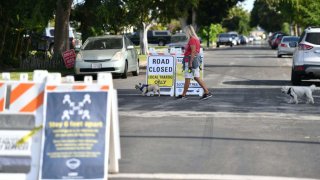
The Mid City West Community Council has announced it will establish a Slow Streets LA program starting Saturday to give pedestrians and cyclists more room to social distance and protection from automobiles during the COVID-19 pandemic.
The Mid City Slow Streets program route will limit vehicle access starting at Colgate and Oakwood avenues, then travel east to Hayworth Avenue before moving a block north to Rosewood Avenue. The Slow Streets will continue along Rosewood until Formosa Avenue, where it will extend north to Willoughby Avenue.
The Los Angeles Department of Transportation has started temporarily closing portions of residential streets throughout the city, and people can apply online to have their neighborhoods included in Slow Streets LA.
"This is an exciting moment for us to have a little bit more space in our neighborhoods to do what we're already doing, walking, taking a young baby out in the stroller, skating, biking," Mayor Eric Garcetti said last Friday. "We're not fully closing any streets. We know that families still need to be able to drive to and from their homes. So emergency access will always be allowed."
Slow Streets LA will close portions of neighborhood streets across two- mile stretches, Garcetti said. This was done last weekend as a test in the Sawtelle and Del Rey neighborhoods.
This first phase of Slow Streets LA covers about seven miles of West Los Angeles streets, Garcetti said. As of last Friday, the mayor said a dozen applications for the program were submitted for neighborhoods around the city.
Local
Get Los Angeles's latest local news on crime, entertainment, weather, schools, COVID, cost of living and more. Here's your go-to source for today's LA news.
Colin Sweeney, a spokesperson for LADOT, said the department is not releasing a full list of Slow Streets LA programs that are in effect at this time because it could cause more people to show up than intended, but neighborhood councils could announce them individually.
According to the Slow Streets LA website, residents and neighborhoods using a slow street must adhere to health guidelines of the Safer at Home orders.
Gatherings of groups, barbecuing with other people, playing games involving physical contact and other gatherings are still prohibited.
Additional information and applications are available here.
"Not everybody lives right next to a park with hills, not everybody's close to the beach, and we should make sure that hard-hit communities and those that are more inland or in flatter areas have the same exercise capacity as other places," Garcetti said.



